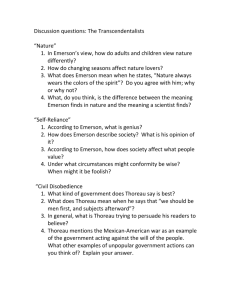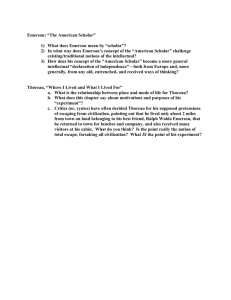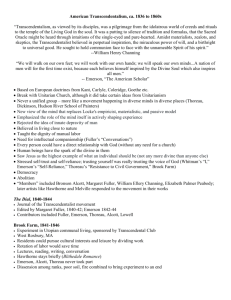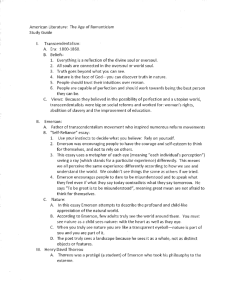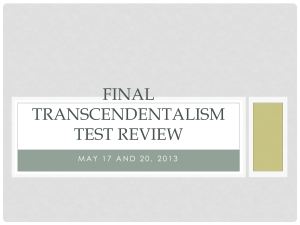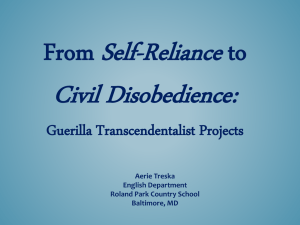Transcendentalism: Essential Essays of Emerson
advertisement
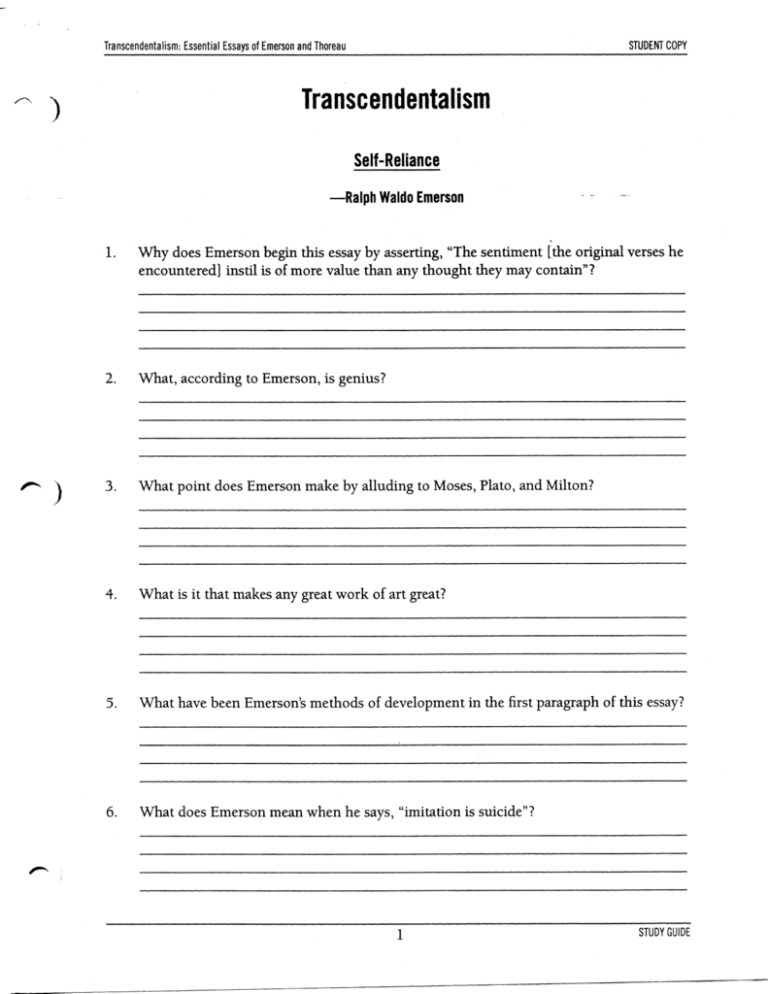
Transcendentalism: Essential Essays of Emerson and Thoreau STUDENT COPY Transcendentalism } Self-Reliance —Ralph Waldo Emerson \. 1. Why does Emerson begin this essay by asserting, "The sentiment [the original verses he encountered] instills of more value than any thought they may contain"? 2. What, according to Emerson, is genius? What point does Emerson make by alluding to Moses, Plato, and Milton? 4. What is it that makes any great work of art great? 5. What have been Emerson's methods of development in the first paragraph of this essay? 6. What does Emerson mean when he says, "imitation is suicide"? STUDY GUIDE Transcendentalism: Essential Essays of Emerson and Thoreau , j STUDENT COPY 7. How does the tone of the essay change in the third paragraph? What is the effect of this change? 8. Where does Emerson find his most effective examples of independence of thought? 9. How does society destroy the individual as he or she matures? 10. What are the religious or theological implications of Emerson's tension between the individual and society? 11. What point is Emerson leading to when he writes, "I do not wish to expiate, but to live. My life is not an apology, but a life"? 12. Explain the dichotomy Emerson theorizes between the public and the private individual. 13. What types of societies to which people sacrifice their individuality does Emerson list? Why is this significant? STUDY GUIDE Transcendentalism: Essential Essays of Emerson and Thoreau STUDENT COPY 14. What is ironic about Emerson's criticism of embracing religious doctrine? 15. According to Emerson, in what way is acceptance of a creed destructive to the individual conscience? 16. Given the context of the previous passage, what does Emerson mean when he says, "A foolish consistency is the hobgoblin of little minds, adored by little statesmen and philosophers and divines"? I 17. For what purpose does Emerson mention Pythagoras, Socrates, Jesus, Luther, Copernicus, Galileo, and Newton? 18. What rhetorical device does Emerson use in this statement: "Your genuine action will explain itself and will explain your other genuine actions. Your conformity explains nothing"? 19. What two attributes would Emerson like to see humanity evince? STUDY GUIDE Transcendentalism: Essential Essays of Emerson and Thoreau STUDENT COPY 20. In what way does Emerson now use various religions and denominations as positive examples? 21. What is the point of the allusion to the story of the "sot" who was convinced he was a duke? 22. What is ironic about Emerson's critique of reading: "Our reading is mendicant and sycophantic"? 23. How does Emerson signal his reader that he is approaching the climax of his essay? 24. What does Emerson mean by the "aboriginal Self? 25. What evidence of the truth Emerson asserts does he find in Nature? 26. Who, according to Emerson, can commune with the Divine, and what role do ancients like King David, the Prophet Jeremiah, or the Apostle Paul play in connecting humankind with the Divine? STUDY GUIDE Transcendentalism: Essential Essays of Emerson and Thoreau , / STUDENT COPY 27. To what effect does Emerson employ metaphor and antithesis when he writes, "But now we are a mob. Man does not stand in awe of man, nor is the soul admonished to stay at home, to put itself in communication with the internal ocean, but it goes abroad to beg a cup of water of the urns of men" ? 28. What is the purpose of Emerson's allusion to the Norse gods, Thor and Woden? 29. What, according to Emerson, is the ultimate consequence of one losing one's self-reliance? 30. Summarize Emerson's points about foreign travel. 31. What, ultimately is Emerson's point? How does he establish it in his final paragraphs? STUDY GUIDE Transcendentalism: Essential Essays of Emerson and Thoreau •v STUDENT COPY Friendship —Ralph Waldo Emerson 1. What is the essence of the prevailing simile in the second paragraph of this essay? 2. What, according to Emerson, is friendship? 3. How, according to Emerson, does one's friendship affect how one regards his or her friend? 4. What is the strength of friendship that allows Emerson to write, "When they are real, they are not glass threads or frost-work, but the solidest thing we know"? 5. In what way is a would-be friend like an Olympian? STUDY GUIDE Transcendentalism: Essential Essays of Emerson and Thoreau_ , ) __ _ STUDENT COPY 6. Explain the two elements that compose a friendship. What place does each hold in the greater context of Emerson's Transcendentalism? 7. What does Emerson consider to be the "prostitution of the name of friendship"? 8. What does Emerson mean when he asks, "Are you the friend of your friend's buttons, or of his thought"? 9. What does Emerson mean when he concludes his essay: "The essence of friendship is entireness, a total magnanimity and trust"? How is this sentiment transcendental? STUDY GUIDE Transcendentalism-. Essential Essays of Emerson and Thoreau STUDENT COPY Civil Disobedience —Henry David Thoreau 1. What contemporary issue does Thoreau reveal as the motivation for this essay? 2. What does Thoreau suggest would be an alternative to government? 3. In what way, according to Thoreau, are soldiers "men of straw," or ulump[s] of earth"? 4. What irony does Thoreau make note of regarding philanthropy? What is his point? 8 STUDY GUIDE Transcendentalism: Essential Essays of Emerson and Thoreau STUDENT COPY 5. How, according to Thoreau, does even the existence of a government perpetuate injustice among the citizenry? 6. Why does Thoreau question the morality or conscience of individual voters? 7. What does Thoreau mean by "Action from principle"? 8. What dilemma does the existence of unjust laws cause for the individual conscience? STUDY GUIDE Transcendentalism: Essential Essays of Emerson and Thoreau x STUDENT COPY fromWalden — by Henry David Thoreau Where I Lived, And What I Lived For / 1. What does Thoreau mean when he writes that a house is nothing more than a scdesl 2. For Thoreau, what was the true value of the farms he visited and surveyed? 3. What effect is created by Thoreau's frequent references to constellations and Greek myth? What is Thoreau's intent? 4. What does Thoreau mean when he says he wanted to "live deliberately"? 5. What does Thoreau likely include in what he calls "the essential facts of life"? 10 STUDY GUIDE Transcendentalism: Essential Essays of Emerson and Thoreau x STUDENT COPY The Village 1. What does Thoreau say in this chapter that suggests that he is not the hermit and the misanthrope he is often accused of being? 2. In what way does Concord resemble a prairie-dog colony? 3. What famous event in Thoreau's life does he allude to at the end of this essay? Why does he save this episode for the end? 11 STUDY GUIDE Transcendentalism: Essential Essays of Emerson and Thoreau STUDENT COPY The Ponds 1. What is Thoreau's point about the flavor of huckleberries? Why can the person who buys them at market or the farmer who grows them for the market not truly taste them? 2. What is the point of the allusion to Adam and Eve? 3. What quality of the pool is Thoreau emphasizing with his allusion to the Castalian Fountain? 4. What effect is achieved when Thoreau asserts hyperbolically that the ponds of Massachusetts are "lovelier than diamonds"? 12 STUDY GUIDE Transcendentalism: Essential Essays of Emerson and Thoreau STUDENT COPY Higher Laws 1. List some of the "higher laws" to which Thoreau alludes. 2. What, according to Thoreau, is the connection between immaturity and hunting, so that he asserts that a boy should eventually outgrow his affection for hunting? 3. What would be ironic about a hunting parson? 4. Explain the pun in Thoreau's observing that a hunting parson might make "a good shepherd's dog, but is far from being the Good Shepherd." 5. Why would Thoreau feel himself diminished every time he catches a fish? 13 STUDY GUIDE Transcendentalism: Essential Essays of Emerson and Thoreau STUDENT COPY Conclusion 1. What does Thoreau suggest about the walls, fences, and boundary lines humans construct in their lives? 2. Why, then, does Thoreau seem to advocate not traveling, but staying home instead? 3. Explain the series of names Thoreau refers to in the third paragraph: Franklin (and his wife), Mr. Grinnell, Mungo Park, Lewis and Clark, and Frobisher. 4. For what does world exploration and expansion of world commerce eventually become a metaphor? 14 STUDY GUIDE Transcendentalism: Essential Essays of Emerson and Thoreau ^ STUDENT COPY 5. Identify Mirabeau. 6. What does Thoreau mean by " hear [ing] a different drummer." 7. What, according to Thoreau, is worse than being supported by a town's benevolence or social welfare? 8. What seems to be Thoreau's criticism of institutional religion? 9. In what way is u [t]he life in us is like the water in the river"? 15 STUDY GUIDE
